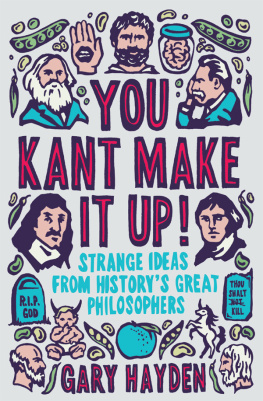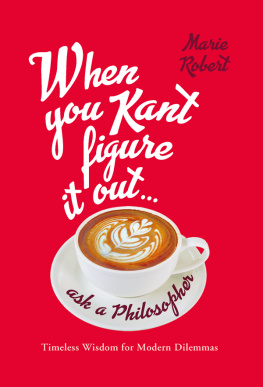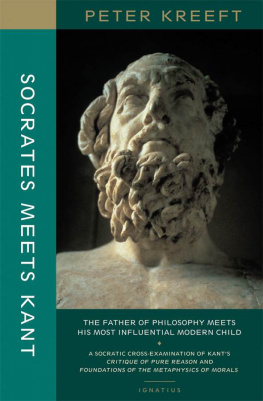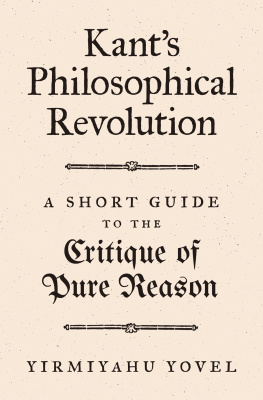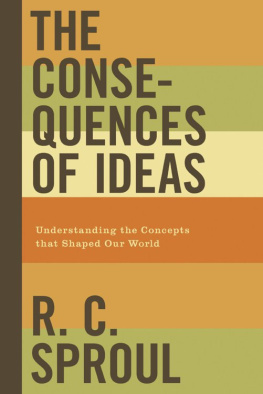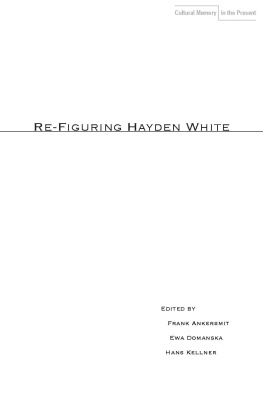Hayden - You Kant Make it Up: Strange Ideas from Historys Greatest Philosophers
Here you can read online Hayden - You Kant Make it Up: Strange Ideas from Historys Greatest Philosophers full text of the book (entire story) in english for free. Download pdf and epub, get meaning, cover and reviews about this ebook. City: Oxford;UK, year: 2011, publisher: Oneworld Publications, genre: Science. Description of the work, (preface) as well as reviews are available. Best literature library LitArk.com created for fans of good reading and offers a wide selection of genres:
Romance novel
Science fiction
Adventure
Detective
Science
History
Home and family
Prose
Art
Politics
Computer
Non-fiction
Religion
Business
Children
Humor
Choose a favorite category and find really read worthwhile books. Enjoy immersion in the world of imagination, feel the emotions of the characters or learn something new for yourself, make an fascinating discovery.
You Kant Make it Up: Strange Ideas from Historys Greatest Philosophers: summary, description and annotation
We offer to read an annotation, description, summary or preface (depends on what the author of the book "You Kant Make it Up: Strange Ideas from Historys Greatest Philosophers" wrote himself). If you haven't found the necessary information about the book — write in the comments, we will try to find it.
You Kant Make it Up: Strange Ideas from Historys Greatest Philosophers — read online for free the complete book (whole text) full work
Below is the text of the book, divided by pages. System saving the place of the last page read, allows you to conveniently read the book "You Kant Make it Up: Strange Ideas from Historys Greatest Philosophers" online for free, without having to search again every time where you left off. Put a bookmark, and you can go to the page where you finished reading at any time.
Font size:
Interval:
Bookmark:
YOU KANT MAKE IT UP!
A tasty smorgasbord of problems, which belie their apparent simplicity by getting to the heart of what it is to reflect on the world philosophically.
Martin Cohen, author of 101 Philosophy Problems
Lively and entertaining. It shows some great philosophers at their weirdest and wonderful best.
Peter Cave, author of Can A Robot Be Human?
A delightful read. Fun and informative.
William Irwin, Professor of Philosophy, Kings College Pennsylvania
ABOUT THE AUTHOR
Gary Hayden is a journalist and popular philosopher. He has a masters degree in philosophy and has written for The Times Educational Supplement and numerous magazines. He is the author of This Book Does Not Exist: Adventures in the Paradoxical.

This ebook edition published by Oneworld Publications 2011
Author of this work has been asserted by him in accordance with the Copyright, Designs and Patents Act 1988
Copyright under Berne Convention
A CIP record for this title is available
from the British Library
ISBN 978 1 85168 907 1 (Special Hardback)
eBook ISBN 978 1 85168 870 8
Cover design by BoldandNoble.com
Printed and bound in Great Britain by
TJ International Ltd, Padstow, Cornwall
185 Banbury Road
Oxford
OX2 7AR
England
One cannot conceive anything so strange and so implausible that it has not already been said by one philosopher or another.
Ren Descartes
Philosophers are clever folk. Some of them outrageously so. Yet they say the strangest things!
Take the German philosopher Gottfried Leibniz. He designed calculating machines; invented calculus independently of Isaac Newton; and made important contributions in physics, logic, history, librarianship and theology. He could hardly have been any cleverer. Yet he claimed that objects dont really have shapes and sizes; and that the world couldnt possibly be any better than it is.
Or consider the French philosopher, Blaise Pascal. He did groundbreaking work in vacuum physics; invented the syringe; gave the world Pascals Triangle; and was one of the founders of probability theory. Yet he said that you ought to believe in God even if you doubt His existence.
Philosophy abounds with strange ideas. As you read this book, youll discover that historys deepest thinkers have claimed that matter doesnt exist; that unicorns do exist; that babies deserve Hell; and that your mind doesnt influence your behaviour.
But why? What is it about philosophy that gives rise to so much weirdness? And how is it that such brilliant people can say such outrageous things? Is it because genius and craziness are so closely linked? Or is there some other reason?
Well, perhaps the main reason for all the weirdness lies in the nature of philosophy itself. Philosophy concerns itself with ultimate questions. This means that philosophers sometimes find themselves operating at the very limits of thought; at the very edge of what is thinkable. And this can be a very strange place.
Think of those cutting-edge physicists who try to figure out what goes on at the quantum level or at the centre of a black hole. They paint a picture of a world very much at odds with the world of common sense. A world where space and time get warped; where fundamental particles pop into and out of existence; and where multiple universes spring into being.
Philosophers are a bit like that. They too ask deep and difficult questions. The kinds of questions that stretch the understanding to its limits and beyond. How are minds related to bodies? Can we ever be absolutely certain of anything? What, if anything, is the point of life? What makes some actions right and others wrong? If theres a God, what kind of being must God be?
In investigating these questions, philosophers take themselves outside the ordinary trammel of thought. So it is hardly surprising that they come up with some very strange-sounding ideas.
The ideas in this book are all strange. But theyre strange in a variety of ways. Some of them, like John Lockes claim that oranges arent orange, seem plainly wrong. Others, like St Thomas Aquinass insistence that masturbation is worse than rape, are deeply shocking. Still others, like Pythagoras claim that everything is number, dont even seem to make sense.
Some of the ideas seem strange when you first encounter them but not so strange once you stop and think about them. A number were considered outrageous when they were first proposed, but have since become quite mainstream (amongst philosophers, at any rate). All of which brings us to an important point...
Strange ideas arent necessarily wrong ideas.
As you read this book youll come across ideas that will surprise you, amuse you, offend you and confuse you. But youll also come across ideas that will convince you. Sometimes youll find yourself nodding in agreement, and accepting ideas you never thought you could accept.
So be warned. A couple of hundred pages from now you may have acquired a firm belief that oranges arent orange; that matter doesnt exist; that Harry Potter does exist; and that this isnt the real world.
Ive arranged this book into forty-three self-contained chapters, each one dealing with a single idea. The topics covered include ethics, logic, politics, metaphysics, psychology, sex and religion. On balance, its probably best to read the chapters in order, and allow yourself time for reflection between each one. But thats not essential. Theres nothing to stop you from hopping around, or reading the whole book in one splurge, if you prefer.
Ive begun each chapter by introducing a strange idea and then giving some of the arguments that a famous philosopher has advanced in its favour. Wherever possible, Ive done that in a way thats fairly sympathetic to the philosophers views. After that, Ive generally offered some criticisms; some arguments that cast doubt on the philosophers idea. Overall, Ive tried to stay impartial so that you can decide for yourself what you make of it all.
At the end of each chapter Ive provided pointers to related chapters. These are for the benefit of those of you who like to hop around where your interests lead you. At the end of the book Ive offered some suggestions for further reading. So if you find a particular philosopher or a particular idea especially interesting, youll be able to find out more.
Font size:
Interval:
Bookmark:
Similar books «You Kant Make it Up: Strange Ideas from Historys Greatest Philosophers»
Look at similar books to You Kant Make it Up: Strange Ideas from Historys Greatest Philosophers. We have selected literature similar in name and meaning in the hope of providing readers with more options to find new, interesting, not yet read works.
Discussion, reviews of the book You Kant Make it Up: Strange Ideas from Historys Greatest Philosophers and just readers' own opinions. Leave your comments, write what you think about the work, its meaning or the main characters. Specify what exactly you liked and what you didn't like, and why you think so.

